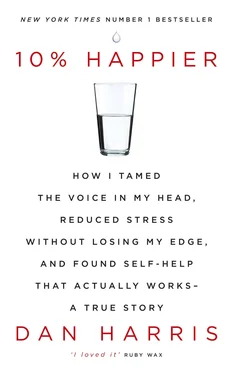Trying to avoid another long, unsuccessful answer, I blurted out, “I do it because it makes me 10% happier.” The look on her face instantly changed. What had been a tiny glimmer of scorn was suddenly transformed into an expression of genuine interest. “Really?” she said. “That sounds pretty good, actually.”
Boom: I’d found my shtick. 10% happier: it had the dual benefit of being catchy and true. It was the perfect answer, really—simultaneously counterprogramming against the overpromising of the self-helpers while also offering an attractive return on investment. It vaguely reminded me of the middling 1990s comedy Crazy People , in which Dudley Moore plays an ad exec who decides to start employing honesty in his taglines, coming up with such gems as “Volvos—Yes they are boxy, but they’re safe,” and “Jaguar—For men who’d like hand jobs from beautiful women they hardly know.” His company sends him to an insane asylum.
My new slogan also jibed nicely with a major behind-the-scenes ethos in TV news: reporters, it was believed, should try never to oversell their stories. You don’t want to go around telling the people who run the various shows that you’ve got the most amazing material in the world, and then leave them underwhelmed. They’ll never put you on the air again. Always best to provide room for upside surprise. (Of course, you’d never know this by watching our product. On the air, we believe in the opposite of underselling; we slap “exclusive” labels on everything.)
I wished I’d had my 10% line at the ready when being questioned by my dad. I couldn’t blame him for being skeptical, but now my new slogan was an effective kryptonite against this kind of wariness. As I started test-driving it with others, it didn’t create any on-the-spot converts, but it did at least appear to prevent people from thinking I had gone completely off the deep end.
About a month or so after the retreat, I got the chance to test the slogan with Mr. Enlightenment himself. I had arranged to interview Joseph Goldstein for a new digital show on religion I’d started called Beliefs . On a sunny day in early September, he showed up at the ABC studios in his khakis and light blue dress shirt, wearing a BlackBerry holster attached to his belt. Outside of the retreat setting, he was looser and funnier—even charmingly goofy at times. We got along like a house on fire.
I started the interview by asking how he discovered Buddhism in the first place. As a young man, he told me, he had been quite brash—“very much in my own head,” he said. He went to Columbia University with the idea of becoming an architect or a lawyer, but he ended up majoring in philosophy. He then joined the Peace Corps. East Africa had been his first choice, but “karma being what it is,” he was shipped off to Thailand, where he got his first exposure to Buddhism. He joined a discussion group for Westerners at a famous temple in Bangkok, in which he proved to be a controversial presence.
“People stopped coming to the group because I came,” he told me, laughing. “You’ve probably been to groups like that, where there’s that one person who doesn’t shut up. That was me. Finally, one of the monks who was leading the group said, ‘Joseph, I think you should try meditating.’ ”
So he did. Alone in his room, he set an alarm clock for five minutes, and was instantly “hooked.”
“I saw that there’s actually a systematic way of becoming aware of one’s own mind,” he said. “It just seemed so extraordinary to me. Before one is clued in, we’re living our lives just basically acting out our conditioning, and acting out our habit patterns, you know?”
He was so excited that he started inviting his friends over to watch him meditate. “They didn’t come back,” he said, laughing.
“So you were slightly insufferable?” I said.
“Ah, yes—slightly insufferable. But I think the meditation over the last forty years has helped.”
After the Peace Corps, he moved to India for seven years to study meditation. Eventually, by the mid-1970s, he decided to move back home to the United States, where he’d been writing books, teaching, and leading retreats ever since.
On the subject of retreats, I asked, “Most people think nine days of all vegetarian food, no talking, and six hours a day of silent meditation sounds like—”
“Hell,” he said, interrupting me with an utterly nondefensive chuckle. But, he added, when people do make the leap and attend a retreat, they get “the first glimpse of what the mind is actually doing. You know, we’re getting a real close, intimate look at what our lives are about.”
That notion really struck me: until we look directly at our minds we don’t really know “what our lives are about.”
“It’s amazing,” I said, “because everything we experience in this world goes through one filter—our minds—and we spend very little time bothering to see how it works.”
“Exactly. That’s why once people get a taste of it—it’s so completely fascinating, because really our life is the manifestation of our minds.”
With things going well, I figured this was the moment to float my new catchphrase. “People ask me—if I dare admit to them I meditate—‘So, is your life better?’ And I like to say, ‘It’s about 10% better.’ ”
“10% is good for beginning a meditation practice. 10% is huge. I mean, if you got 10% of your money—”
“Yeah, it’s a good return on your investment.”
“It’s a good return, and it gets more—the return gets more and more.”
This turn in the conversation was perhaps inevitable. By the return on investment getting “more and more,” Joseph was, of course, signaling that one could not only be 10% happier, but also 100% happy.
“I will admit,” I said, “I remain skeptical about this notion of enlightenment. So I want to ask you, do you feel that you have achieved it?”
“No,” he said. But he very quickly went on to say something that surprised me. While he hadn’t reached full enlightenment—the complete uprooting of greed, hatred, and delusion about the nature of reality—he was, he claimed, partway there.
I’d read up on this issue a little bit since the retreat. According to the school of Buddhism to which Joseph belonged (there were many, I’d learned), there were four stages of enlightenment. The schema sounded like something out of Dungeons & Dragons. Someone who’d achieved the first stage of enlightenment was a “stream-enterer.” This was followed by a “once-returner,” a “non-returner,” and then a fully enlightened being, known as an “arhant.” Each stage had sixteen sublevels.
“So you’ve achieved some of the early stages?”
“Yes, and there’s more work to be done.”
“How do you translate that into your daily life? When you start to lose your hair, or when somebody you love dies, or when your favorite baseball team starts to not be so good anymore, you don’t suffer?”
“I would say that the amount of suffering in those situations has diminished enormously. It’s not that I have different feelings, but I don’t identify and attach to them—or make them a huge drama. You allow your emotions to come pass through with ease.”
“Are you not afraid of dying?”
“One never knows until we’re at that doorway, but right now I’m not.”
How was I supposed to compute this? Here I was, sitting across from a fiercely intelligent, self-deprecating guy who, like Mark Epstein, could easily have been one of my Jewish uncles. Nothing about this person screamed “crazy.” And yet he was telling me that not only did he believe in enlightenment—a seemingly fantastical transformation that denudes the mind of all of the things most of us believe make us human—but also that he was partway there. Was this some sort of affinity scam?
Читать дальше












